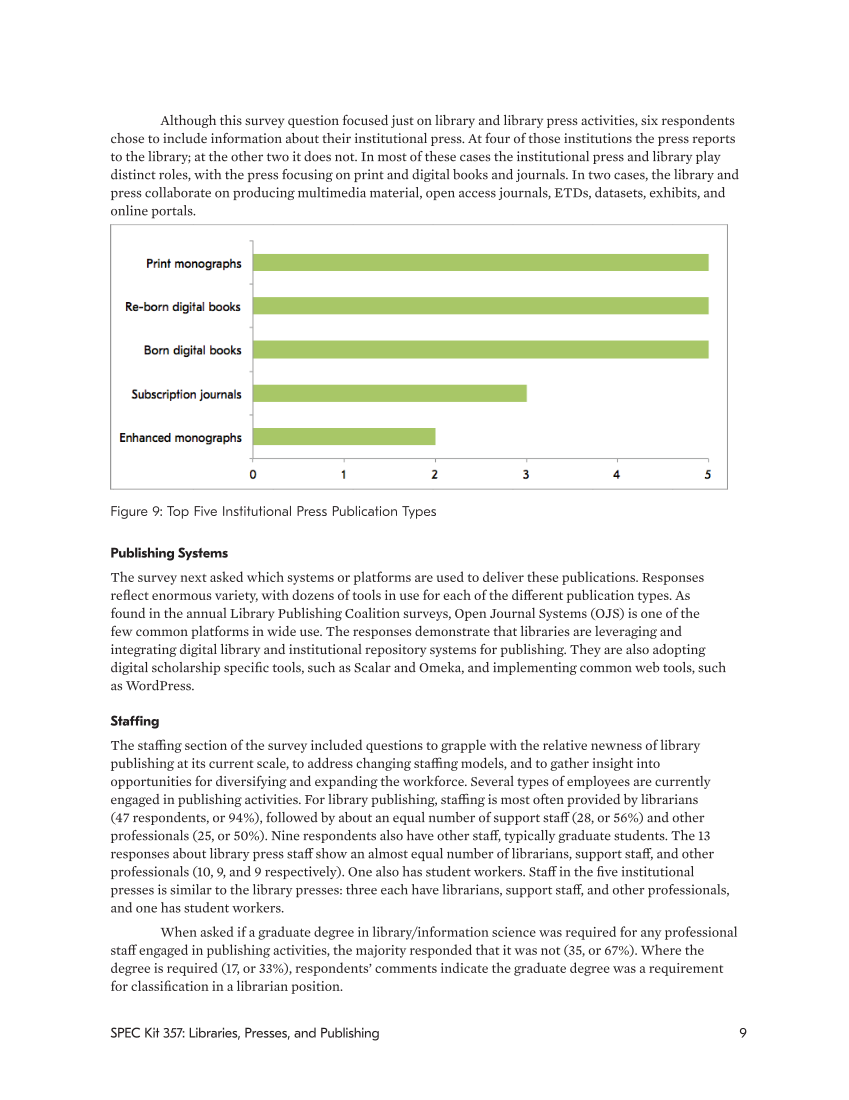9 SPEC Kit 357: Libraries, Presses, and Publishing
Although this survey question focused just on library and library press activities, six respondents
chose to include information about their institutional press. At four of those institutions the press reports
to the library at the other two it does not. In most of these cases the institutional press and library play
distinct roles, with the press focusing on print and digital books and journals. In two cases, the library and
press collaborate on producing multimedia material, open access journals, ETDs, datasets, exhibits, and
online portals.
Figure 9: Top Five Institutional Press Publication Types
Publishing Systems
The survey next asked which systems or platforms are used to deliver these publications. Responses
reflect enormous variety, with dozens of tools in use for each of the different publication types. As
found in the annual Library Publishing Coalition surveys, Open Journal Systems (OJS) is one of the
few common platforms in wide use. The responses demonstrate that libraries are leveraging and
integrating digital library and institutional repository systems for publishing. They are also adopting
digital scholarship specific tools, such as Scalar and Omeka, and implementing common web tools, such
as WordPress.
Staffing
The staffing section of the survey included questions to grapple with the relative newness of library
publishing at its current scale, to address changing staffing models, and to gather insight into
opportunities for diversifying and expanding the workforce. Several types of employees are currently
engaged in publishing activities. For library publishing, staffing is most often provided by librarians
(47 respondents, or 94%), followed by about an equal number of support staff (28, or 56%) and other
professionals (25, or 50%). Nine respondents also have other staff, typically graduate students. The 13
responses about library press staff show an almost equal number of librarians, support staff, and other
professionals (10, 9, and 9 respectively). One also has student workers. Staff in the five institutional
presses is similar to the library presses: three each have librarians, support staff, and other professionals,
and one has student workers.
When asked if a graduate degree in library/information science was required for any professional
staff engaged in publishing activities, the majority responded that it was not (35, or 67%). Where the
degree is required (17, or 33%), respondents’ comments indicate the graduate degree was a requirement
for classification in a librarian position.
Although this survey question focused just on library and library press activities, six respondents
chose to include information about their institutional press. At four of those institutions the press reports
to the library at the other two it does not. In most of these cases the institutional press and library play
distinct roles, with the press focusing on print and digital books and journals. In two cases, the library and
press collaborate on producing multimedia material, open access journals, ETDs, datasets, exhibits, and
online portals.
Figure 9: Top Five Institutional Press Publication Types
Publishing Systems
The survey next asked which systems or platforms are used to deliver these publications. Responses
reflect enormous variety, with dozens of tools in use for each of the different publication types. As
found in the annual Library Publishing Coalition surveys, Open Journal Systems (OJS) is one of the
few common platforms in wide use. The responses demonstrate that libraries are leveraging and
integrating digital library and institutional repository systems for publishing. They are also adopting
digital scholarship specific tools, such as Scalar and Omeka, and implementing common web tools, such
as WordPress.
Staffing
The staffing section of the survey included questions to grapple with the relative newness of library
publishing at its current scale, to address changing staffing models, and to gather insight into
opportunities for diversifying and expanding the workforce. Several types of employees are currently
engaged in publishing activities. For library publishing, staffing is most often provided by librarians
(47 respondents, or 94%), followed by about an equal number of support staff (28, or 56%) and other
professionals (25, or 50%). Nine respondents also have other staff, typically graduate students. The 13
responses about library press staff show an almost equal number of librarians, support staff, and other
professionals (10, 9, and 9 respectively). One also has student workers. Staff in the five institutional
presses is similar to the library presses: three each have librarians, support staff, and other professionals,
and one has student workers.
When asked if a graduate degree in library/information science was required for any professional
staff engaged in publishing activities, the majority responded that it was not (35, or 67%). Where the
degree is required (17, or 33%), respondents’ comments indicate the graduate degree was a requirement
for classification in a librarian position.



















































































































































































